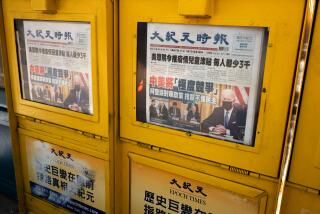Journalism on trial
- Share via
ABOUT A YEAR AND A HALF AGO, a Chinese researcher for the New York Times named Zhao Yan scrawled a four-sentence note to the paper’s bureau chief in Beijing, speculating about a disagreement among China’s leaders over military promotions. Because of that handwritten memo, he now faces a possible 10-year prison term, or even execution. That’s what reporters get for doing their jobs in China, where leaders lately have been ruthlessly cracking down on journalists, dissidents, Internet users and anybody else they feel threaten their grip on power.
Zhao was indicted last week on charges of disclosing state secrets and fraud, 15 months after his detention and on the last working day for prosecutors to decide whether to pursue the case. His “trial” is expected within six weeks, though we use the term advisedly. Trials involving state secrets are closed in China, and a key witness in Zhao’s defense -- the Times’ Beijing bureau chief -- will be forbidden to testify on the grounds that he is a foreigner. So Zhao’s conviction is all but certain.
The government’s case is absurdly weak. Zhao was arrested after the Times published a story last year correctly speculating that then-President Jiang Zemin was soon to step down. Zhao’s memo reportedly is the key piece of evidence against him, yet it made no mention of Jiang’s imminent retirement, and Times officials have said Zhao was not a source for the article.
It’s clear Zhao is being targeted simply because he dared report on the inner workings of China’s Communist Party, which is intensely sensitive to the slightest leak. He is far from alone in his predicament. The New York-based Committee to Protect Journalists reports that for the seventh year in a row, China is the world’s leading jailer of journalists, with 32 behind bars. The committee gave one of them, Shi Tao, its 2005 International Press Freedom Award; earlier this month, Zhao was named journalist of the year by Reporters Without Borders.
The only way to persuade Beijing to release Zhao and other wrongly detained journalists is to demonstrate that the benefits of such jailings -- which send a message to other reporters to steer well clear of party operations -- are outweighed by the damage they do to the nation’s foreign relations and image. President Bush and Secretary of State Condoleezza Rice have criticized the Chinese government over Zhao’s arrest. They need to intensify the pressure, as do other world leaders.
More to Read
Sign up for Essential California
The most important California stories and recommendations in your inbox every morning.
You may occasionally receive promotional content from the Los Angeles Times.













